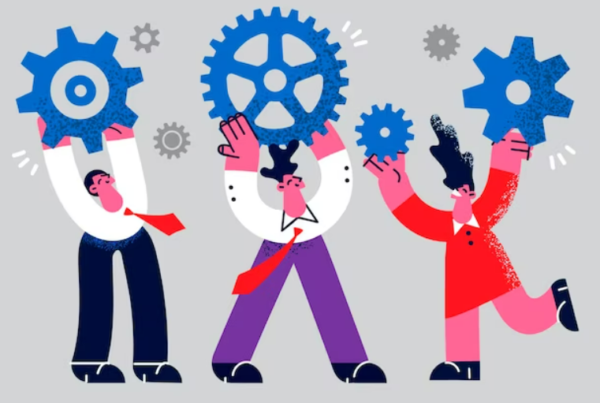Keeping employees productive and motivated is a critical issue for firms and leaders. However, in order to do so, they must first comprehend what causes productivity declines, as well as the strategic solutions that may be implemented to minimize the problem.
Employers are constantly concerned about maintaining worker productivity. However, without a thorough grasp of what causes efficiency loss in the first place, it can be difficult to find out how to maintain and improve production.
If you’re finding that your staff aren’t as productive as they may be, this article will provide you with information on some possible causes as well as urgent answers.
Four Reasons Why Your Employees Aren’t Productive
1. A Lack of Acknowledgement
Employees are not functioning robots, but rather human beings. That implies they have emotional reactions to things, such as how their bosses and supervisors treat them at work.
Of course, we’re all aware of how emotions can obstruct our ability to finish jobs – anxiety or grief, for example, can make working much more difficult. As a result, it is critical to identify employees by paying attention to them. Employee productivity can be impacted by feelings of not being recognized or appreciated, just like any other emotional reaction. Employees who do not feel valued might easily become demotivated and find it difficult to continue working at full potential.
2. Ineffective Communication
Too many managers think of communication as a one-way street: they tell staff what they need to do and then the dialogue ends. However, this type of communication structure is out of date and does not promote optimal workplace efficiency.
Employees should be able to express their problems and suggestions to their bosses through two-way communication in the workplace. Managers can better understand what may be inhibiting their productivity and seek to remove such hurdles by listening to staff and developing team-building activities. Similarly, managers should ensure that employees are aware of the “who, what, when, where, why, and how” of their company so that they may better comprehend their boss’s motivations.
3. Employee Dissatisfaction
In modern culture, the terms “burnout” and “workplace stress” are often used interchangeably. Unfortunately, this minimizes the negative impact of burnout on an employee’s overall health. Burnout is categorized as a diagnosable mental health disease in the World Health Organization’s ICD-11, the same diagnostic tool used by doctors to diagnose depression and anxiety.
In short, employee burnout is a serious issue that businesses must address by creating a healthy work environment for their employees and not taking burnout lightly. Employers should assess whether they are expecting their staff to multitask excessively, perform excessive work after hours, and whether the office climate is friendly, among other things, to minimize employee burnout.
4. Lack of Adaptability
COVID-19 has hastened the transition in workplace culture that has occurred over the last couple decades. Modern workers have a strong desire for schedule flexibility, and when employers are unable to provide it, morale and, ultimately, productivity suffer.
While not all companies can support extremely flexible scheduling, making an effort in this area by reducing mandated hours and allowing your staff to choose when they work can go a long way.
4 Ways to Boost Workplace Productivity
1. Provide Work Schedule flexibility
When it comes to comprehensively evaluating what contributes to top-tier performance from their staff, employers frequently have big blindspots. Many companies mistakenly believe that dominating with an iron hand will enhance production, yet the contrary is usually true.
Allowing employees more flexibility can actually help them maintain a better work-life balance, which leads to higher motivation and a lower risk of burnout, both of which can negatively impact employee performance.
The solution is to provide your employees with flexible work schedules. If you’re having trouble keeping track of your employees’ schedules, employee scheduling software can help. Employees have the freedom to pick when they want to work and when they don’t want to work. It also keeps supervisors informed about who is available for work.
2. Acknowledgement, Rewards, and Incentives
It’s crucial to remember that employees are people, and they react to the same things that everyone else does. Rather than micromanaging and policing your employees, utilize positive reinforcement techniques such as recognition, awards, and incentives.
You might begin by praising your employees for their hard work and expressing genuine gratitude. You can also start rewarding staff with more paid time off or even higher compensation if they meet certain performance goals. These incentives and prizes will help to motivate your employees, which will lead to increased production.
3. Encourage Collaboration and Communication
People work best when they believe their work serves a greater cause. Workers can be instilled with that motivation through communication and teamwork.
In other words, make an effort to explain to each of your employees how their job adds to the company’s overarching goals and how they fit into the team as a whole. Not only may this aid with motivation, but it can also assist staff in determining the best way to carry out their responsibilities.
4. Make Employee Health and Well-being a top priority
Employers who place too much emphasis on their bottom line often find themselves shooting themselves in the foot. While improvements in workplace rules can have a positive impact, it is usually the adjustments that affect employees’ overall well-being that have the most impact.
Implementing employee wellness programs may help minimize burnout, enhance overall productivity, promote a better workplace culture, and make your employees happier and healthier people, all of which has its own set of benefits.
Many bosses believe that the best way to deal with unproductive staff is to become more rigorous in the office. If you want your staff to perform better at work, it’s a lot better idea to be kinder, more understanding, and empathetic to them.
If you treat your employees like humans and treat them with the respect they deserve, they’ll most likely repay you with good work.




